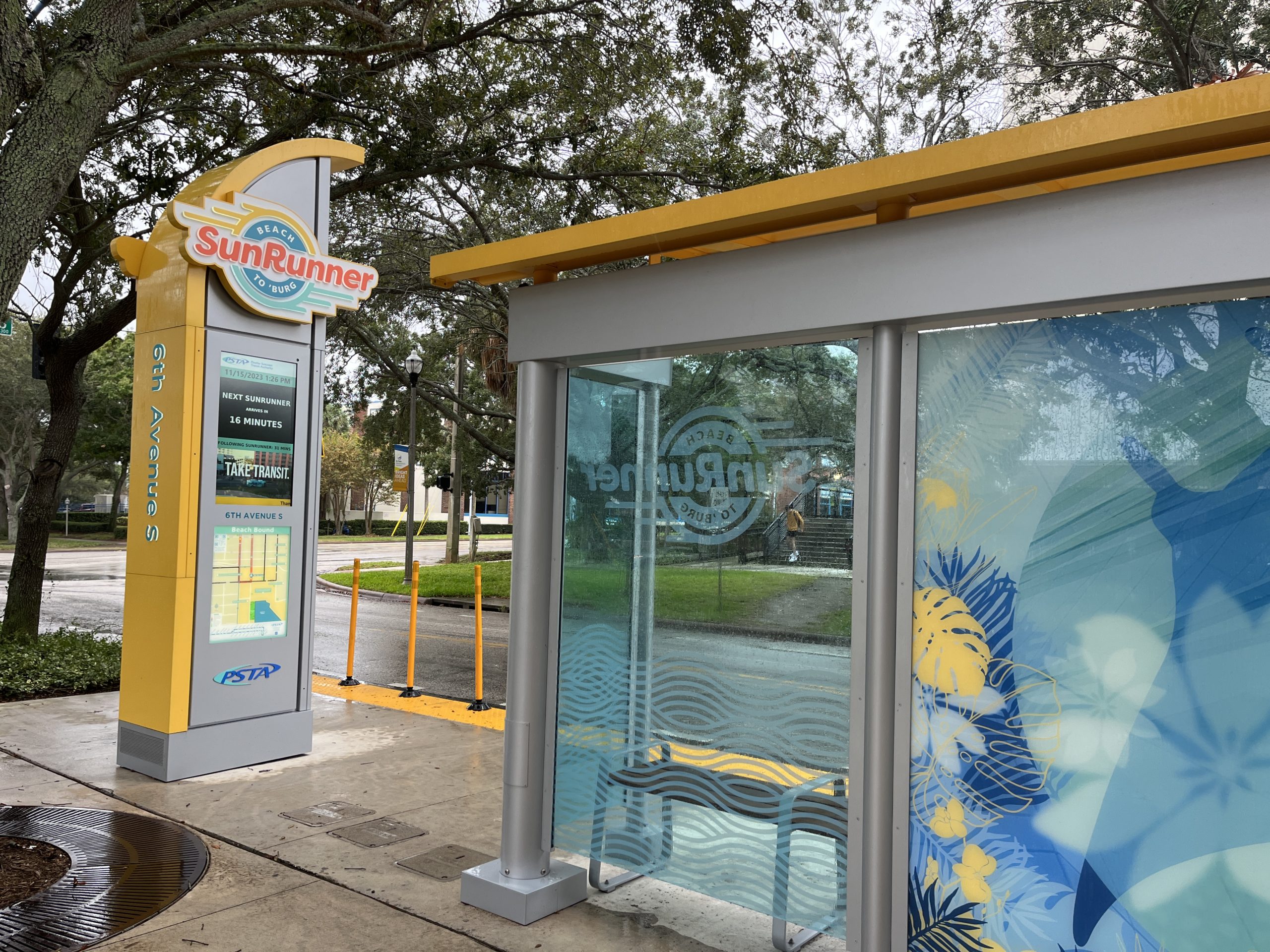One SunRunner stop is located at the University of South Florida campus.
Photo by of Suzanne Townsend | The Crow’s Nest.
By Suzanne Townsend
From October 2022 St. Petersburg’s SunRunner ran free of charge, carrying passengers between downtown St. Petersburg and St. Pete Beach, but complaints about an influx in homeless people around St. Pete Beach have led to the installment of a fare sooner than was originally expected.
Most of the complaints came from St. Pete Beach residents who were concerned about this increase in the homeless population in the area and blamed the SunRunner for carrying homeless passengers to the beach from downtown. The air conditioning and power outlets provided on the bus made it possible to beat the intense Florida heat and charge electronic devices while you ride. Whether or not the SunRunner is definitively to blame for the increase in homeless, in the summer months the beach became a more popular spot for unhoused people to spend the night because it was cooler than downtown alternatives, although sleeping on the beach at night is illegal and violates trespassing laws.
In a meeting on Aug. 23, Pinellas County Sheriff Bob Gaultieri said that the “homeless issues” began in March, and law enforcement was having to expend more resources in order to deal with problems such as public nudity when homeless individuals used the showers at the public beach accesses. Families were concerned for obvious reasons, and local law enforcement also came across instances of public urination and defecation. Residents also complained that they were being accosted at the Dolphin Plaza shopping center, which is across the street from a SunRunner stop at one of the main beach access parks. At September’s monthly Pinellas Suncoast Transit Authority (PSTA) board meeting a St. Pete Beach resident, Jill Kashner said, “I’m afraid someone’s gonna throw a Molotov cocktail into my window,” As of now, there have been no instances of crimes involving Molotov cocktails.
Calls for service at Dolphin Plaza increased from an average of 20 calls per week in 2022 to 127 per week the following year. “It was costing $10,000 a week to have deputies out there,” Gaultieri said at the August PSTA board meeting. At the same meeting he noted that since July 25 there had been 52 arrests issued, 132 trespass warnings and 32 ordinance violations.
PSTA’s Chief Executive Officer Brad Miller had proposed an immediate installment of fares only on the westbound stops where the bus was headed towards the beach. The proposal was struck down, however, because of its targeted nature. St. Pete Beach City Commissioner Chris Marone blames the SunRunner for these issues as well. At a meeting on Aug. 8 he said, “It’s the buses and who they’re bringing in, and the Sheriff said we cannot just pick these people up and drive them somewhere and drop them off. We’re not allowed to do that. We can make their lives miserable.”
St. Petersburg Mayor Ken Welch, however, opposed the implementation of a fare and said he even allocated money in the city’s 2024 budget to keep the SunRunner free of charge.
When the SunRunner began running city officials decided it would be free in order to encourage more use and help people get accustomed to the new route. There had always been a plan to begin charging fares in October 2023, but due to concerns about homeless people fares began a month early.
As of September, a ride costs $2.25 or you can pay $5 for a day pass and $70 for a one month pass. Students, youths, seniors and those with disabilities can pay half that. Groups of up to five people can get a day pass for $10 and children 8 or younger ride for free. Only contactless payment is accepted, no cash, which opponents of the fare installment, such as the Homeless Leadership Alliance of Pinellas, say unfairly targets a specific group of people.
Intrastate travel is protected under the Florida Constitution so some opponents of the change, including lawyers, have noted that the cashless fare is restrictive and discriminatory.
Of the approximately 100,000 riders the SunRunner carries per month, there is a significant number of riders who the fare poses a considerable financial burden on. People who have been utilizing the bus to get to jobs where they make minimum wage or to get to the grocery store and other errands will have to reconfigure an already tight budget to account for these new fares.



